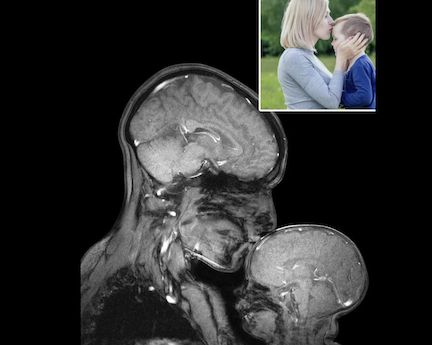The Power of a Mother's Kiss
Floating around Facebook (and other socials) is beautiful expression of the impacts of physical, parental affirmation through the mechanism of the simple kiss. Though it is less a scientific treastise than a poetic metaphor, it does indeed capture the essence of legitimate scientific research. It goes like this:
When a mother kisses her son, it’s not just a tender gesture — it’s biology weaving an invisible bond.
In that simple moment — lips to skin — a cascade of extraordinary things unfolds deep within the brain:
Neuroimaging reveals the hidden symphony:
— The nucleus accumbens and dopamine pathways light up, wiring joy and reinforcing the primal connection.
— The amygdala and hypothalamus, architects of emotion, ignite to nurture safety and belonging.
— Oxytocin, the famed “love hormone,” floods both bodies, lowering stress, sealing trust, deepening attachment.For the child, that kiss does more than soothe:
It quiets the stress circuits — regulating cortisol, calming fears, nurturing emotional resilience.
A mother's kiss isn’t ordinary. It’s ancient biology — a whispered promise of protection, of unconditional presence.
In that fleeting second, a shelter is built in the brain… and the roots of lifelong security begin to grow.
Love leaves traces science can finally see — but a child feels them long before they understand.

For a couple of links for some scientific coroberration, click here and here.
The Lord often compares his love to the love of an earthly parent for their child.
"As a mother comforts her child, so will I comfort you ...” (Isaiah 66:13, NIV).
“Can a mother forget the baby at her breast and have no compassion on the child she has borne? Though she may forget, I will not forget you!” (Isaiah 49:15, NIV).
"As a father has compassion on his children, so the LORD has compassion on those who fear Him" (Psalm 103:13, NIV).
“Which of you, if your son asks for bread, will give him a stone?... how much more will your Father in heaven give good gifts to those who ask him!" (Matthew 7:9, 11, NIV).
Indeed, God's love isn't abstract—it’s embodied in the most intimate human relationships we know.
Mothers (and fathers!), you have been granted a divine ability to be a physical conduit of the all encompassing, eternal, empowering, comforting love God in the lives of your children. It is their birthright to know and understand and feel the connection they can have with the Father by experiencing it first through you.
Love them deeply. Kiss them often.
And in those moments communicate to them not just "your" love and affection, but explain that it is but a picture, a conduit of the love their great Father in heaven has for them!
The Love of a Father
My father grew up in the Depression era in a leaky and cold house. He said, in winter months, he could sometimes have snow in his bedroom. The house was not well insulated, so the wind could bring a chill. Though the conditions were difficult, he never questioned the loved of his father.
One frigid night, my father woke up and was thirsty. He called out to his dad and asked him for some water. They did not have running water in the house, so my grandfather had to go outside in the cold to get a cup of water. My dad could hear the floor creaking as my grandfather stepped through the dark house. He heard the door open and the ice breaking as my grandfather got the water from a bucket that had frozen over.

As my grandfather brought the cup of water to my dad's bedside, my dad said he had never felt so loved as he did in that moment. His father had sacrificed his own comfort to satisfy my dad's thirst. What a great example of a father's love.
Our heavenly Father has done this for us. He knows what we need and He provides for us even better than our earthly fathers can.
But the greatest lesson is this. He has loved us to the point of His own personal sacrifice. Jesus left the comforts of heaven to come down to this dark world to satisfy our deepest thirst. He came so that we would never thirst again.
Jesus answered her, “If you knew the gift of God and who it is that asks you for a drink, you would have asked him and he would have given you living water. ... whoever drinks the water I give them will never thirst. Indeed, the water I give them will become in them a spring of water welling up to eternal life" (John 4:11, 14, NIV).
Love is Horizontal and Vertical
If we were to peek behind the drywall in this room and notice that all of the vertical studs had been removed, and there were only horizontal beams, we would leave the building as soon as possible. And likewise, if the building only had vertical studs and no horizontal beams, we would feel unsafe knowing that the building was not stable. We'd run for the exits!

Likewise, if we took a piece of fabric and pulled out all of the vertical or horizontal strands, we would be left with nothing but a handful of strands and dangling threads in either hand. The piece of fabric only exists because the strands run in different directions, giving body and support, and form to the cloth.
God's love is limitless in every direction (Eph. 3:18).
"And may you have the power to understand, as all God’s people should, how wide, how long, how high, and how deep his love is" (Ephesians 3:18, NLT).
God's love is not one dimensional. He instructs us and shows us to love one another, even as He has love us, because our love for Him and others originates from Him and the sacrifice of Jesus Christ on our behalf (1 John 3:16; 4:7-10).
Jesus' death reveals us to be liars when we say things like, "I love God with all my heart, but I just can't get along with him/her." Or, "I get along with everyone, but I just don't have any time for God."
We fool ourselves when we say we love Him (vertical strands of faith), but do not love others (horizontal strands of faith). Or when we say we have love and care for our fellow man, but show no love or care for the God who created us all.
Like a poorly constructed building or poorly woven cloth, our love and relationships are flimsy at best and dangerous at worst, when they are not rooted and grounded in the multi-dimensional love of God.
What an opportunity to grow in our love for one another as we pursue a deeper relationship of love for God!